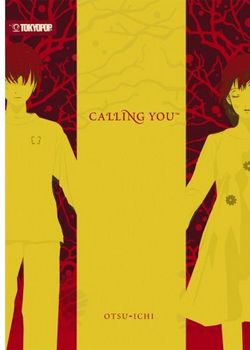- Comics
- Comics Reviews
- Manga
- Comics Reviews
- European Comics
- News
- Comics News
- Press Releases
- Columns
- Spotlight
- Digital Comics
- Webcomics
- Cult Favorite
- Back Issues
- Webcomics
- Movies
- Toys
- Store
- More
- About
By Leroy Douresseaux
June 5, 2007 - 10:59
 |
CALLING YOU
Around the turn of the year, TOKYOPOP published a manga entitled Calling You. It was a collection of manga short stories based on the work of writer, Otsu-ichi. Now, TOKYOPOP has released the original prose stories as the latest addition to their “Pop Fiction” line, and it’s also entitled Calling You.
This slim volume, which is also an illustrated novel (featuring twenty illustrations), contains three tales of supernatural mystery. In the title story, a lonely girl creates an imaginary telephone in her head and gets the surprise of her life when she gets a phone from a lonely young man who has also created a phone in his mind. Their first meeting, however, could end in tragedy (think The Lake House).
In “Kiz/Kids,” Keigo, a troubled outcast, finds himself in the special needs class after a fight at school. There he meets Asato, a smaller boy even more troubled than he is, but the boy has a magical power to take away people’s pain and hurt. Now, Keigo has to protect Asato from healing so many people that it kills him, but if Keigo can’t stop him, he’ll have to find a way to help Asato. In “Flower Song,” a young man, hospitalized after the accident that killed his lover, feels as if his convalescence is time spent in a coffin. When he discovers a strange flower in a nearby forest, he gets a chance to bring comfort to a restless spirit and perhaps to himself.
The Lowdown: The English adaptation by Django Wexler of Otsu-ichi’s original Japanese text focuses on simple, yet evocative language. Metaphors, symbolism, and complicated sentence structure are absent in favor of straightforward storytelling. Calling You’s dominant theme over the three stories is that people walk a narrow line, straddling light and dark. An individual can accept that no life will be without bad times, even horrible times, but he or she will have to struggle to embrace the light in spite of the urge to wallow in pity, self-loathing, and loneliness. Suicide is the other option.
For readers of: The stories are more spiritual than uplifting because they emphasize acceptance of the dark as the way to appreciate the light. Young readers into gothic or Goth storytelling and those who are struggling through the quagmire of their teen years will find a steady ray of hopeful light even in the melancholy of these tales.
B
The earlier review of Calling You.